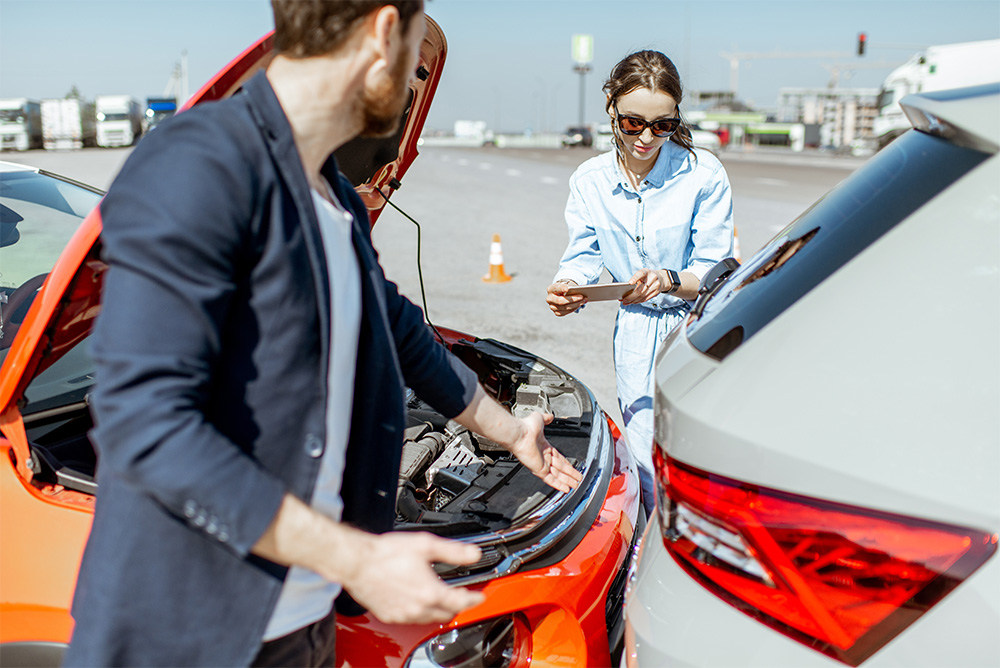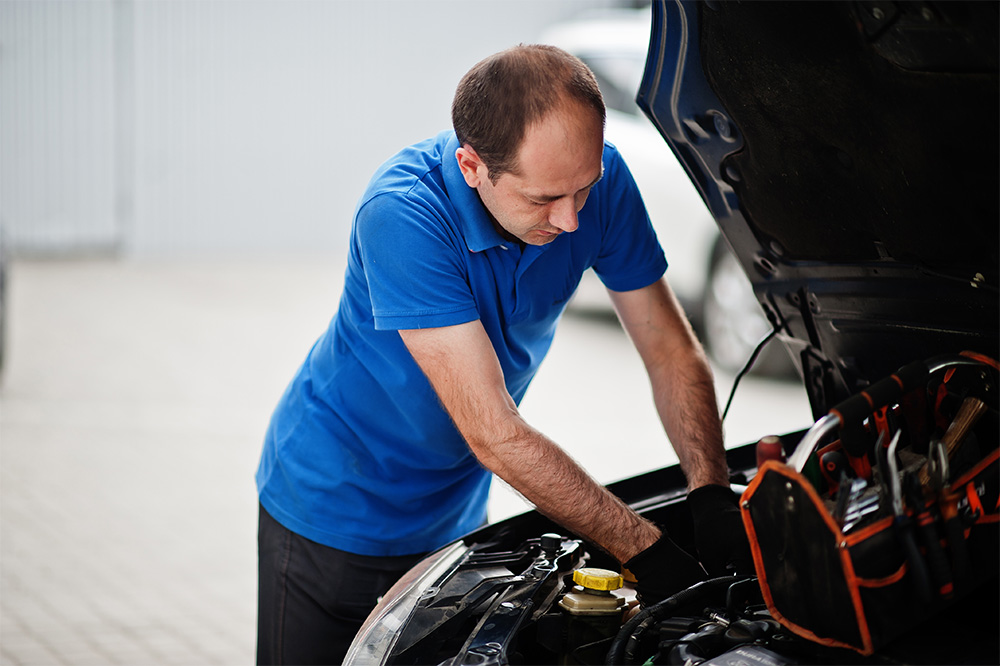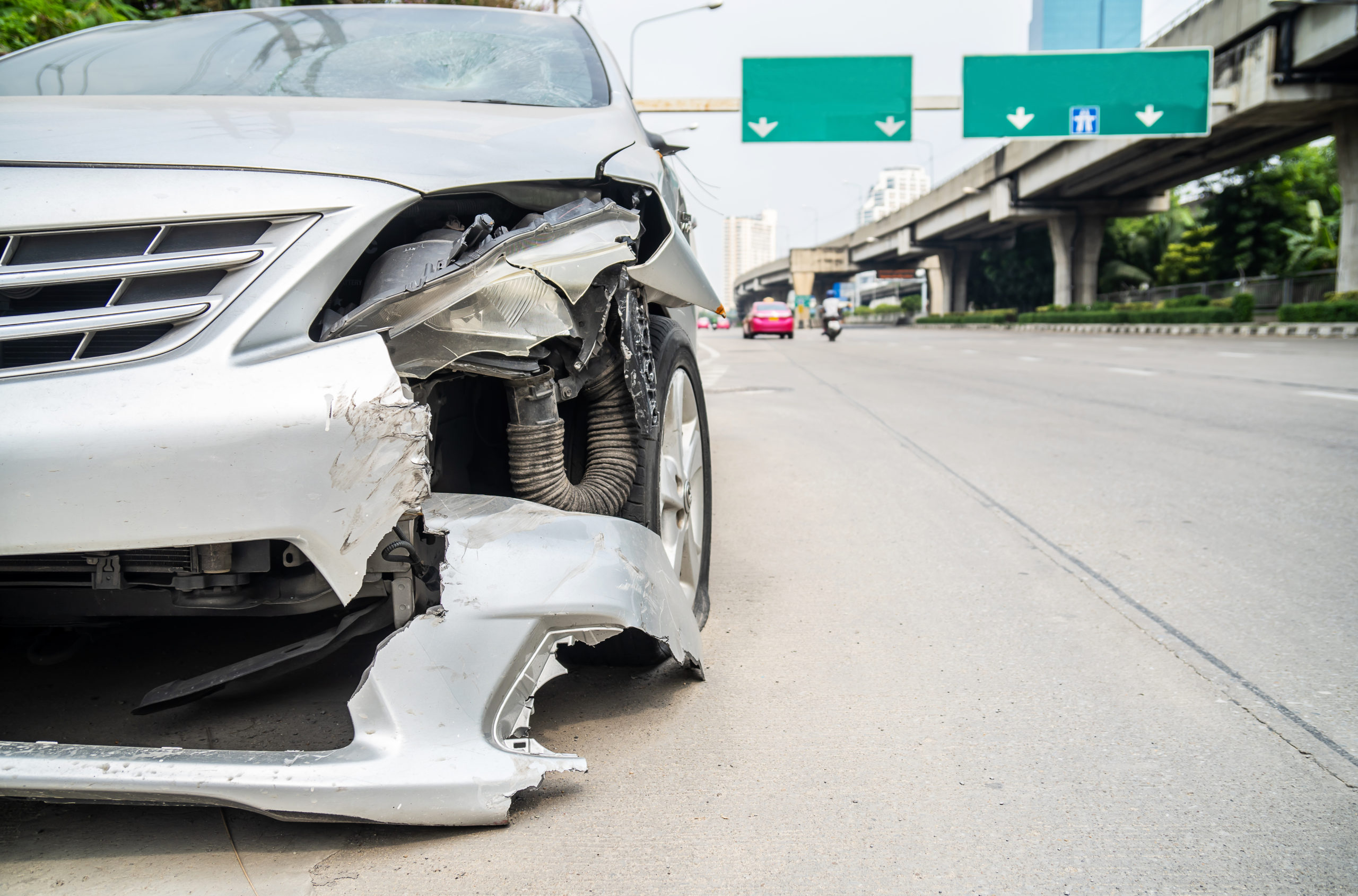Injuries, property damage, and even death. Without a doubt, car accidents can be stressful and overwhelming. But the truth of the matter is this — a significant number of accidents can be avoided. It’s why we firmly believe that knowing the most common causes of car accidents in Jacksonville, FL and how to avoid them can save your life.
What are the most common causes of car accidents?
Whether it’s cell phone use or driving while drowsy, it pays to be aware of what can lead to wrecks. After all, the last thing any driver wants is to go through the collision repair process, or even worse, experience tragedy.
Right now, we’re breaking down the top ten most common causes of car accidents. As we share each cause, we’ll also share practical tips to help keep you and other drivers safe.
- #1 – Distracted Driving
- #2 – Speeding
- #3 – Driving While Impaired
- #4 – Reckless Driving
- #5 – Tailgating
- #6 – Running Red Lights
- #7 – Fatigue and Drowsy Driving
- #8 – Poor Weather Conditions
- #9 – Failure to Yield Right of Way
- #10 – Inadequate Vehicle Maintenance
- You Can Overcome the Most Common Causes of Car Accidents
- What do I do if I'm in a car accident?
#1 – Distracted Driving
Just over 3,000. That’s how many lives the National Highway Traffic Safety Administration (NHTSA) estimates were lost as a result of distracted driving in 2019.
Distracted driving is most simply defined as paying attention to something else other than driving. This can include your cell phone, eating, putting on makeup, or other distractions in your car.
Understanding Distracted Driving
There are three main forms of distracted driving: visual, manual, or cognitive:
- Visual distractions involve taking your eyes off the road.
- Manual distractions involve taking your hand off the wheel.
- Cognitive distractions involve taking your focus from driving.
What’s more, is that these forms of distracted driving can overlap or happen simultaneously.
Types of Distractions
Most will associate cell phone use as a common form of distracted driving, and with good reason. Whether you’re using a cell phone to make calls, text, or use apps, keeping your eyes off the road for even a split second can result in a tragic accident.
Beyond cell phones, some other common distractions include:
- Eating and drinking often means taking one or both of your hands off the wheel.
- Other passengers can pull your attention from the road.
- Adjusting controls, such as the radio or GPS, can result in taking your eyes off the road for long periods of time.
Another distraction most drivers don’t want to mention? Pets. Though they may be friendly companions, having an animal in the car can create enough of a distraction to cause an accident.
How to Avoid Distracted Driving
Some simple ways you can avoid distracted driving include:
- Use hands-free devices. Take things a step further by placing your phone out of reach when you drive, like in your purse or in the backseat.
- Complete tasks before driving. This includes eating, finishing that text, or making that phone call.
- Plan your route. Look at your GPS beforehand and begin to familiarize yourself with where you’ll be going.
Finally, never be afraid to set boundaries. If you have passengers in the car, let them know you can’t take your eyes off the road. If you hear your phone ring, resolve to answer when you’re not driving. In taking these small, simple steps, you can make a world of difference in reducing accidents and saving lives.
#2 – Speeding
Sometimes we’re in a rush, and sometimes we’re impatient. No matter the reason, speeding is against the law and can result in serious car crashes.
The Dangers of Speeding
What makes speeding so dangerous? For one, it reduces any driver’s ability to safely steer a vehicle. Speeding also makes taking curves more difficult, and also makes it harder to avoid any objects or barriers that may be in the road.
Speeding also increases the distance a vehicle needs to travel in order to stop. That means if you find yourself in a dangerous situation and you need to brake, it may be difficult to stop in a timely matter.
How to Avoid Speeding
There’s no other way to say it — to avoid speeding, you must be intentional about how fast you drive.
- Follow speed limits. Be sure to adjust your speed according to weather and traffic conditions.
- Schedule plenty of time to travel. Give yourself enough time to reach your destination without speeding.
Speeding is a choice. Choosing to drive at safe speeds will ultimately make our roads safer for everyone.
#3 – Driving While Impaired
Driving under the influence of alcohol, drugs, or certain medications is not only illegal, but it is extremely dangerous. Impaired drivers are compromised. They have reduced reaction times, and decision-making abilities, ultimately putting themselves and others in grave danger.
Understanding Impaired Driving
Impaired driving is operating a vehicle under the influence of alcohol or drugs, which significantly affects a person’s ability to drive safely.
The Impact of Driving Impaired
Take, for instance, the effects of alcohol on a driver. Alcohol acts as a depressant, which means it slows down vital functions, including the ones you use to drive your car and exercise good judgment. Remember — even small amounts of alcohol can affect your ability to drive safely.
How to Avoid Impaired Driving
The best way to avoid impaired driving is to avoid taking drugs, certain medications, or consuming alcohol before driving. Other important reminders:
- Designate a sober driver. Aim to designate a sober driver or arrange alternative transportation before you leave the house.
- Spread the word. Educating others goes a long way, especially among friends and family. Talk about the dangers of impaired driving and the importance of making responsible choices.
Impaired driving is a personal choice that begins with personal responsibility.
#4 – Reckless Driving
You’ve seen it before. Tailgating, changing lanes without signaling, and disregarding traffic laws. These are all aggressive driving behaviors known as reckless driving. It’s the kind of behavior that puts everyone in danger and an obvious entry on our list of the most common causes of car accidents.
Understanding the Reckless Mindset
It’s not always easy to understand why drivers choose reckless behaviors. But one thing is clear — reckless drivers display an attitude that prioritizes themselves and their priorities over the safety of themselves and others.

Reckless Behaviors are Common Causes of Car Accidents
While any disregard for the law can be considered reckless driving, some more common behaviors include:
- Tailgating, or driving too closely to the car in front of you. This leaves no room for error or sudden braking.
- Weaving through traffic. In other words, changing lanes quickly without signaling or regard for others.
How to Avoid Reckless Driving
In the end, the way to avoid reckless driving is to take personal responsibility.
- Practice patience. Even if you find yourself in a challenging driving situation, aim to stay calm and be patient.
- Follow traffic rules. This especially includes any traffic laws and signals as you respect the safety of yourself and others.
Bottom line? Drivers must put safety before aggression and agitation.
#5 – Tailgating
Next on our list of the most common causes of car accidents is tailgating. Simply put, tail gaiting is driving too closely behind another vehicle. The closer you drive behind another vehicle, the harder it becomes to respond to sudden changes.
The Dangers of Tailgating
To get a better idea of just how dangerous tailgating can be, all you need to do is picture a simple scenario: two cars on the road, one driving behind the other.
Let’s say traffic starts to build up, and. the driver of the first car needs to slow down. However, there’s a problem — the second car is awfully close, practically on the bumper. The first driver suddenly brakes and seconds later, everyone can hear the crash. Because the second driver was riding too close, the two cars collided.
How to Avoid Tailgating
Sadly, this scenario is more common than you think. It’s also avoidable.
- Maintain a safe distance. Experts suggest following the three-second or three-car rule to maintain a safe distance from the vehicle in front of you.
- Adjust your distance as conditions change. This includes increasing the distance between your car and the one in front of you in bad weather or poor road conditions.
By maintaining a safe distance between cars, drivers can provide the space and time necessary to react quickly to the unexpected without getting in an accident.
#6 – Running Red Lights
What may appear to be a harmless act can, in fact, carry very serious consequences. Running red lights is not only against the law, but it can lead to catastrophic collisions.
The Consequences of Running Red Lights
Besides being ticketed by police, running a red light can lead to collisions, property damage, physical injuries, and even fatalities.
How to Avoid Running Red Lights
When it comes to running red lights, the best prevention is to obey the rules of the road.
- Stop at red lights. Begin to slow down when you see a yellow light. Make sure you also come to a complete stop once the light turns red.
- Exercise caution. Even if you just got a green light, look in all directions for cross-traffic before you go.
It’s about much more than just following the law — it’s about preventing injuries and saving lives.
#7 – Fatigue and Drowsy Driving
Perhaps you’ve heard it said that drowsy driving can be just as dangerous as drunk driving. According to the Sleep Foundation,
“After 20 hours of being awake, drowsy drivers are impaired on a level equatable to a 0.08% blood alcohol content, which is the current legal limit in most states.”
Here’s the deal — fatigue impairs your ability to drive safely, and it can be just as harmful as driving under the influence. In fact, one might say that drowsy driving is a silent killer on the roads.
Understanding Fatigue
Fatigue can be best understood as a condition characterized by decreased mental and physical performance and reduced attentiveness — all due to a lack of rest or sleep.
The Risks of Drowsy Driving
The risks of driving drowsy are numerous. Impaired judgment, delayed reaction, compromised vision, and a high likelihood of falling asleep are all dangerous side effects that can result in unimaginable tragedy.
How to Avoid Fatigue and Drowsy Driving
Driving while fatigued or drowsy is 100% percent avoidable.
- Get enough sleep. Ideally, you want to get between 7-9 hours of sleep before driving long distances.
- Take breaks. Plan to stop every 2-3 hours, especially on longer drives.
Even if it means pulling over for a nap, any step you can take to remain alert and awake while driving will undoubtedly save lives.
#8 – Poor Weather Conditions
When you consider how difficult it can be to drive through rain, snow, fog, or ice, it shouldn’t be surprising that poor weather is on our list of the most common causes of car accidents in Jacksonville, FL. Any of these weather conditions will significantly increase the risk of getting in a wreck.
The Hazards of Poor Weather Conditions
Perhaps the most obvious hazards associated with bad weather are reduced visibility and slippery roads. With reduced visibility, it becomes harder to see the cars, the road, and the conditions around you. With slippery roads, it becomes harder to brake and control your car.
How to Avoid Car Accidents in Poor Weather Conditions
First and foremost, drivers should make it a habit to check the weather forecast before heading on the road. If the weather looks dangerous, your best bet will be to stay home. However, if you must go out, you’ll want to —
- Reduce your driving speed. Don’t be afraid to slow down, or even pull over, in inclement weather.
- Prepare your car. This includes making sure your tires, brakes, and lights are working well.
Bottom line? Being prepared and driving carefully will be the key to not only maintaining control of your vehicle but also keeping others safe on the road.
#9 – Failure to Yield Right of Way
There is a reason why right-of-way traffic rules are in place — to prevent collisions and to save lives. As drivers fail to yield the right of way to other drivers, the likelihood of ending up in a collision increases. This applies to many common scenarios, including merging on highways or turning on major roads.
The Importance of Right of Way
Without right-of-way rules, driving would be chaotic and lacking order. But with these rules in place, drivers can better understand and predict how traffic flows. Ultimately, this helps ensure safe, efficient roadways.
Common Scenarios for Right of Way
Some common right-of-way scenarios we can all keep in mind include.
- Stopping at Intersections: It’s important to know and understand who needs to wait and who has the right to go at intersections. It may seem simple, but knowing this information is critical in preventing unnecessary wrecks.
- Merging onto Highways. This is especially important as highway drivers are already at accelerated speeds. It’s important to yield to other drivers as you merge on highways to ensure a safe, smooth flow of traffic.
How to Avoid Failure to Yield Car Accidents
As the common expression goes, “Knowledge is power.” When it comes to avoiding failure-to-yield accidents, drivers must have knowledge of traffic rules under their belts.
- Refresh yourself on the rules of the road. Take the time to familiarize yourself with right-of-way rules, and make it a point to follow them.
- Be patient. Impatience can lead to rash decisions with serious consequences. Exercise patience and allow others to go first when necessary.
We can’t emphasize it enough — respecting the right of way is an important step in preventing car accidents. Obey the rules of the road to ensure the best possible experience on the road.
#10 – Inadequate Vehicle Maintenance
Rounding out our list of the most common causes of car accidents? Not taking care of your car. Believe it or not, neglecting regular vehicle maintenance like changing your oil can result in mechanical failures when you least expect it.
The Importance of Vehicle Maintenance
The goal of regular maintenance is optimal performance. If you’re not keeping up with your car’s scheduled maintenance, you increase the risk of experiencing failures on the road, putting yourself and others in danger.

Common Maintenance Lapses
Many drivers will mistakenly believe that they can put certain maintenance tasks off. This, however, is extremely dangerous, as it weakens your car’s ability to respond in a timely matter.
- Brake Failures. Neglecting your brakes can result in worn-out brake pads or malfunctioning systems. This means that if you need to brake quickly, your car won’t be able to respond on time.
- Tire Blowouts. Tires that are balding or underinflated both pose serious dangers. In each scenario, drivers can lose control, resulting in a serious collision.
How to Avoid Car Accidents Due to Inadequate Maintenance
Don’t put it off, and don’t make excuses. Be vigilant in taking care of your car.
- Regular maintenance. Educate yourself on your car’s maintenance schedule, and stick to it. Also, make the time to do regular checks on your car’s essential systems.
- Timely repairs. Even if it seems minor, be sure to address issues and concerns right away.
For some drivers, car maintenance can be a financial burden. Our advice? Put some money away each month for car repairs. That way, if the unexpected does arise, you’ll be better prepared to respond, and quickly.
You Can Overcome the Most Common Causes of Car Accidents
Car accidents don’t have to be inevitable. You have the power to keep yourself and our community safe by being an informed and responsible driver.
In the end, overcoming the most common causes of car accidents in Jacksonville begins with awareness, and a willingness to create and maintain good, smart habits.
What do I do if I’m in a car accident?
Even with our best efforts, accidents do happen. And, perhaps you have questions about what to do next. The good news? Our experienced staff has decades of experience in repairing cars after accidents, and we can help navigate the repair process.
Victor’s Body Shop, family-owned and family-run since 1989, is your trusted Jacksonville auto body shop. Contact us today for a free estimate, and find out why we treat our customers like family!

